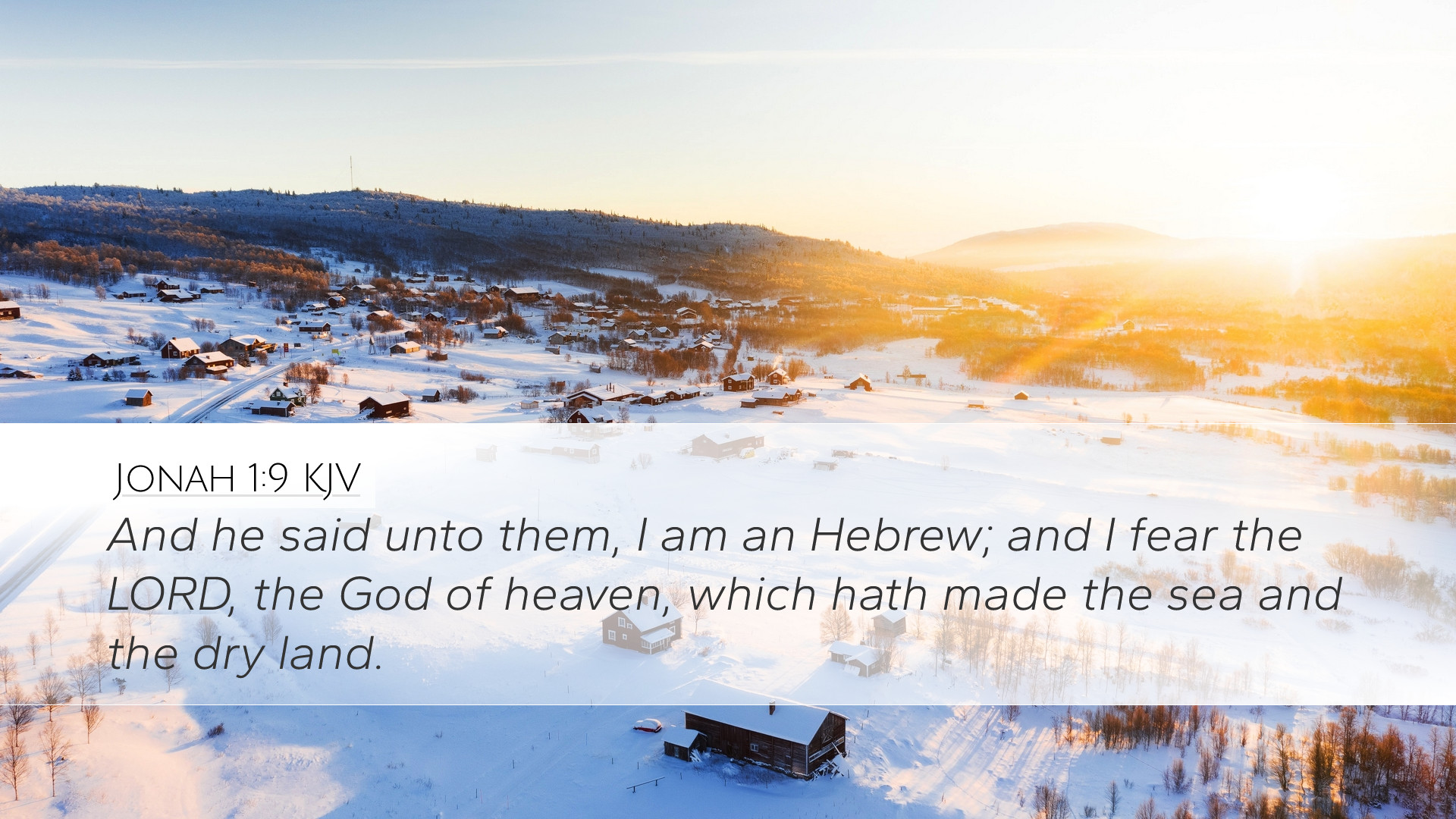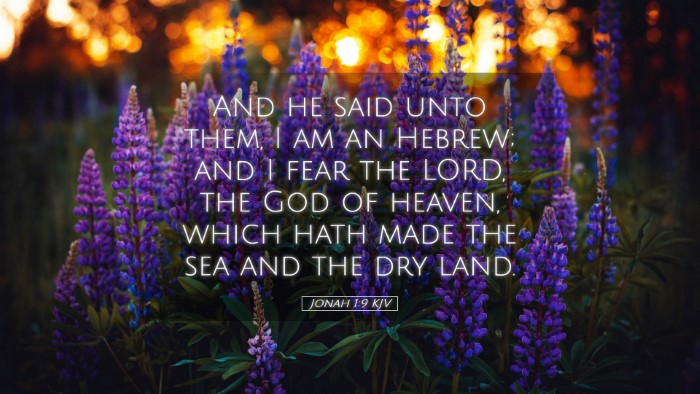Old Testament
Genesis Exodus Leviticus Numbers Deuteronomy Joshua Judges Ruth 1 Samuel 2 Samuel 1 Kings 2 Kings 1 Chronicles 2 Chronicles Ezra Nehemiah Esther Job Psalms Proverbs Ecclesiastes Song of Solomon Isaiah Jeremiah Lamentations Ezekiel Daniel Hosea Joel Amos Obadiah Jonah Micah Nahum Habakkuk Zephaniah Haggai Zechariah MalachiJonah 1:9
Jonah 1:9 KJV
And he said unto them, I am an Hebrew; and I fear the LORD, the God of heaven, which hath made the sea and the dry land.
Jonah 1:9 Bible Commentary
Commentary on Jonah 1:9
Verse Reference: Jonah 1:9 - "And he said unto them, I am a Hebrew; and I fear the LORD, the God of heaven, which hath made the sea and the dry land."
Introduction
This verse serves as a critical point in the narrative of Jonah, presenting not only Jonah's identity but also his relationship with God. Here, we will explore the profound implications of his statement, focusing on its theological and ethical dimensions. The insights provided by biblical commentators such as Matthew Henry, Albert Barnes, and Adam Clarke illuminate the depth of this passage.
Jonah’s Identity
In this declaration, Jonah identifies himself as a Hebrew. This is significant in several ways:
- Cultural Significance: The term ‘Hebrew’ signifies his ethnic and cultural identity. Matthew Henry notes that Jonah distances himself from the pagan sailors by asserting his heritage, reflecting the tension between Israel's mission and its failures.
- Relational Context: Adam Clarke emphasizes that Jonah's identification highlights the distinction between God’s people and those who do not know Him. This division encapsulates the larger biblical narrative of God's chosen people.
- Missionary Implications: Albert Barnes remarks that Jonah’s claim is paradoxical; he is a prophet fleeing from God's command to preach to the very Gentiles on the ship, illustrating the struggle of a national identity versus a divine calling.
Fear of the LORD
Jonah's proclamation of fearing the LORD brings us to the heart of his faith:
- The Nature of Fear: To "fear the LORD" indicates a profound respect and reverence for God. According to Matthew Henry, this fear is not merely terror but a wholesome dread that inspires obedience.
- Contradiction in Actions: Adam Clarke observes the irony in Jonah's fear of the LORD while simultaneously running from His presence. This duality serves as a powerful reminder of the human propensity to avoid God's commands despite an intellectual acknowledgment of His sovereignty.
- Theological Implications: Albert Barnes interprets this fear as a recognition of God’s dominion over all creation. The fear of God compels one to act in accordance with His will, emphasizing the necessity of aligning actions with beliefs.
God of Heaven
Jonah specifies that he fears "the LORD, the God of heaven." This designation is rich in meaning:
- Divine Sovereignty: The phrase "God of heaven" underscores God’s supremacy over all earthly powers. Matthew Henry notes that Jonah acknowledges God's authority over the chaotic sea, emphasizing that divine governance extends beyond Israel.
- Global Authority: Albert Barnes points out that Jonah recognizes God’s power as universal, and this acknowledgment represents an important theological premise; God is not merely the deity of Israel but the Creator of all.
- Encouragement for Prayer: Adam Clarke highlights that recognizing God as the “God of heaven” should incite humility and encourage prayerful dependence on God, especially in times of distress.
Creation and Control
Jonah mentions God’s creation of "the sea and the dry land," which emphasizes several key themes:
- Creator Identity: Declaring God as the creator reinforces His omnipotence. Matthew Henry articulates that by acknowledging God's role as the Creator, Jonah reaffirms God’s power over nature and the universe.
- Human Responsibility: Adam Clarke discusses that this acknowledgment may instill a sense of responsibility in Jonah, reminding him that he was created for a purpose, which he is currently neglecting.
- Theological Reflection: Albert Barnes emphasizes that the creation of both sea and land illustrates God’s comprehensive authority, which should bring comfort to believers facing turbulent circumstances.
Conclusion
In Jonah 1:9, the prophet's confession encapsulates the tension between identity, ethics, and divine authority. Jonah's statement serves as a call to reflection for all who identify as followers of God. As Matthew Henry, Adam Clarke, and Albert Barnes reveal, this passage invites us to examine our fidelity to God against the backdrop of our fears and responsibilities. In engaging with this text, we are challenged to ensure our actions align with our claims of faith and to remember that, despite our failings, God remains sovereign over all creation.


